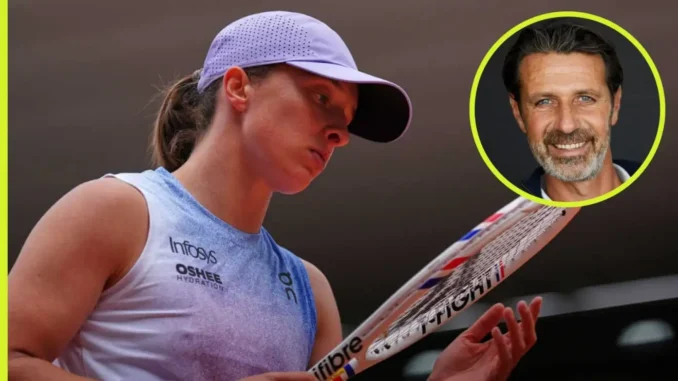
The 2025 French Open has been a cauldron of drama, and at its center is a provocative comment from renowned tennis coach Patrick Mouratoglou, who sparked a firestorm by declaring that Iga Świątek, the four-time Roland Garros champion, is “not a superstar” like Serena Williams or Maria Sharapova. The statement, made amid heated controversy over the tournament’s scheduling of women’s matches, has ignited a broader debate about gender equality, star power, and the commercial realities of tennis. As Świątek battles for her fourth consecutive title in Paris, Mouratoglou’s remarks have added fuel to an already contentious narrative, drawing reactions from players, fans, and pundits alike.
The controversy stems from the French Open’s decision to schedule only men’s matches in the prime-time night sessions on Court Philippe-Chatrier for the first 11 days of the 2025 tournament. Stars like Carlos Alcaraz, Novak Djokovic, and Jannik Sinner have headlined these coveted 8:15 p.m. slots, while top women’s players, including Świątek, Aryna Sabalenka, and Coco Gauff, have been relegated to daytime matches. This disparity prompted sharp criticism from players like Ons Jabeur, who called it “a shame” for women’s tennis, and Alizé Cornet, who argued that the quality of the women’s game deserves equal spotlight. Tournament director Amélie Mauresmo defended the scheduling, insisting that the single night match must maximize fan satisfaction and revenue, noting, “The message has never been the girls are not worthy of playing at night. It’s never been this.”
Mouratoglou, currently coaching Naomi Osaka and a former mentor to Serena Williams, waded into the debate via Instagram, arguing that daytime slots offer greater exposure for women’s tennis due to broader television audiences. “The people who complain that there is no women’s match in the night session, I think it’s unfair to Roland Garros,” he said. “There is more exposure in day matches than night matches, because it’s on national TV, the audience is huge compared to platforms.” He further contended that night-session ticket holders expect to see “superstars” like Alcaraz or Djokovic, whose global appeal drives ticket sales. “Most of the people who go to stadiums are not core fans of tennis, they want to come back home and say ‘I saw Djokovic’ or ‘I saw Alcaraz’, if they come back and they say ‘I saw Swiatek’ it’s not the same,” he explained. His most contentious remark came when he singled out Świątek: “It’s not only about leading players like Iga Swiatek, who is a four-time winner, and a three-time winner at the moment. She’s not a superstar like Serena when she was playing or Sharapova when she was playing.”
The backlash was swift. Fans and commentators on social media platforms called Mouratoglou’s comments dismissive, arguing that Świątek’s 40-3 Roland Garros record and five Grand Slam titles warrant superstar status. Others defended his perspective, noting that women’s matches, being best-of-three sets, risk ending quickly—potentially disappointing fans who paid premium prices for night sessions. “If it’s a women’s match that can be 6-1, 6-1 in one hour, people are going to be extremely unhappy,” Mouratoglou said, highlighting the structural difference with men’s best-of-five-set format. He also praised Mauresmo, dismissing suggestions of bias: “You cannot even think that Amélie Mauresmo would try to do something against women’s tennis. It makes no sense.”
Świątek, who advanced to the semifinals with a 6-1, 7-5 win over Elina Svitolina, sidestepped the controversy, saying, “I understand, but I’m not making the schedule.” Gauff, set to face French wildcard Loïs Boisson in the other semifinal, expressed reluctance to play late-night matches, noting, “There’s only one 8:15 p.m. slot, and I don’t think any girl wants to play after that.” Despite her measured response, Świątek’s on-court dominance—she’s lost just 12 games en route to the semifinals—underscores her stature, even as Mouratoglou’s comments question her marketability.
The debate reflects broader tensions in tennis, where commercial imperatives often clash with calls for equality. Świątek’s 2025 season, marked by a loss of the No. 1 ranking to Sabalenka and no titles before Paris, hasn’t diminished her clay-court prowess. Yet, Mouratoglou’s remarks, coupled with his earlier critique of Świątek’s crowd complaints in 2024—“Sorry Iga Świątek, I think fans should be allowed to shout out during tennis matches”—highlight a pattern of scrutiny. As the French Open heads toward its climax, with Świątek facing Sabalenka in a blockbuster semifinal, the focus remains on whether her on-court brilliance can redefine what it means to be a tennis superstar.
Leave a Reply